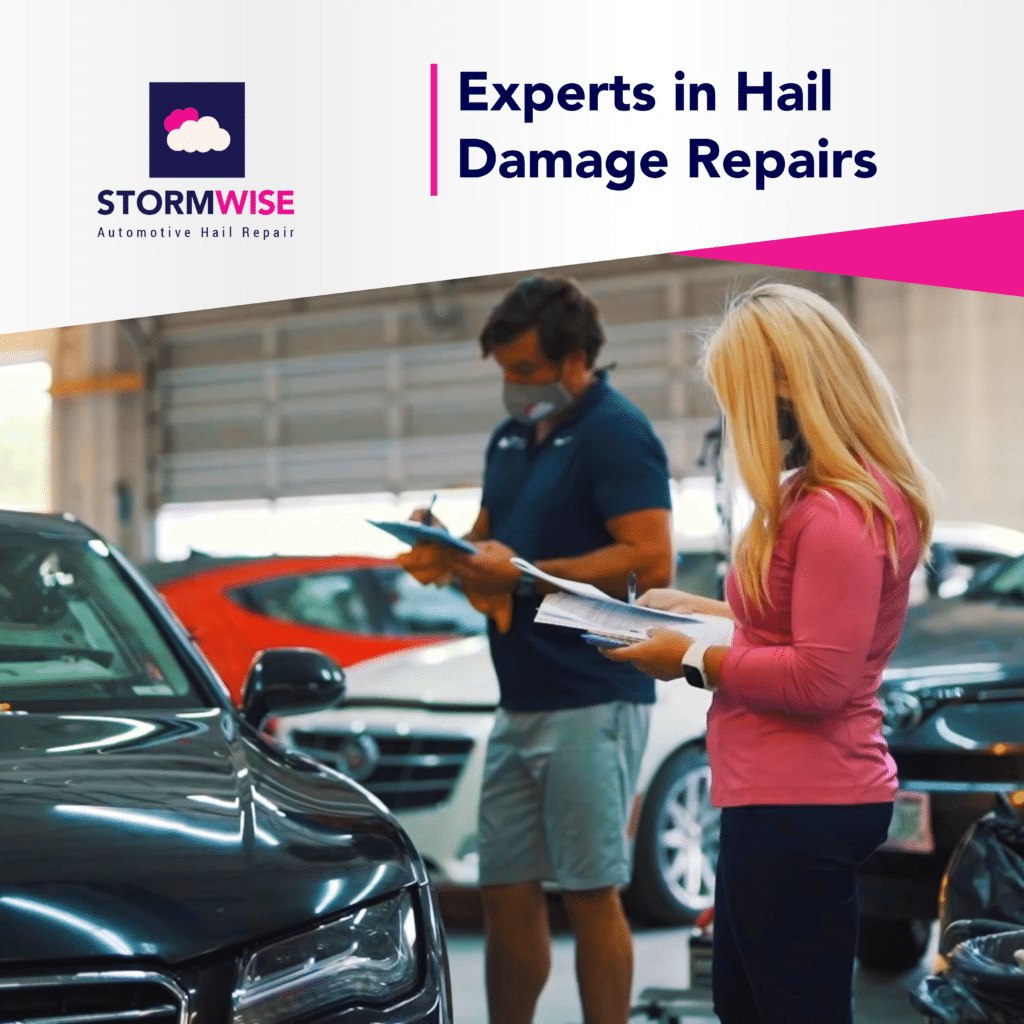After April showers and May flowers comes the summer hail. It causes millions in damage each year, including to cars all over the Front Range.

Paintless dent repair (PDR) has been a great boon for areas like ours that fall in Hail Alley. But the shift by carmakers toward using aluminum parts and panels makes it more challenging to fix a dent.

This guide should help you understand why aluminum dent repair is different from working with steel and what you need to know about hail damage repair for cars and trucks made with aluminum.
What Is PDR?
Auto hail repair used to involve adding body filler to the damaged spot, sanding everything down, then repainting the spot to match.

This process is laborious and rarely gives you a perfect match. Your car will always look as though a spot has been repaired.
With paintless dent repair, AKA. PDR, as long as the paint is intact and the dent isn’t too complex, it returns to factory perfection. PDR can remove 80-90 percent of dents, whether from pea-sized hail or road debris. As long as the technician can get behind the dent, they can massage it out.

You do need specialized tools to massage the metal from the underside, along with years of training and practice. It can be a bit of an art form, but the process allows you to get your car back to factory perfection while keeping the original factory finish.
What You Can Repair with PDR
The goal with PDR is to fix the dent without impacting the car’s paint job. While the largest hailstone recorded in Colorado was 4.85” across and weighed half a pound, most hail is small and leaves just a tiny, shallow dent. These are perfect use cases for PDR.
The two things we consider when assessing whether a dent is reparable with PDR are the paint and size. If the damage has broken the paint, your dent isn’t a candidate for paintless dent repair. It will need filler and new paint to fix it.
In the same way, deep creases and punctures don’t qualify for PDR. They will need repair by more traditional methods.
Understanding Metal Memory
What makes paintless dent repair work is a concept called metal memory. This means that metal tends to want to return to the previous shape it held rather than the dent made by the hailstone.

As long as the dent isn’t too big, you can use PDR to remind the metal that it really wants to be back in that nice smooth shape.
When the dent is large, the metal stretches. It doesn’t want to return to the smooth, flat shape it held before because now it has a new memory to hold on to.
Any dent that has a sharp ridge, creasing, or anything that looks like the metal might have twisted or torn can disqualify a dent from PDR because the metal memory has changed.
Why Aluminum Is Difficult for PDR

Most metal and alloy body panels can be repaired with PDR, but aluminum requires a different approach. It’s not so much difficult or hard as much as different. You need different equipment, training, and skills to repair aluminum.
Metal Memory
The primary reason aluminum is different to work with goes back to the concept of metal memory. While steel can be coaxed right back to its smooth shape, aluminum is less cooperative. In general, it’s just more pliable to work with and deformable when hit.
Heat
Aluminum also reacts differently from steel when heat is applied. Because of metal memory, steel doesn’t need any heat to be brought back to shape. Aluminum not only needs heat for shaping, but it is also tricky in how it reacts to heat.
Too much heat can compromise the integrity of the aluminum and leave it permanently softened. But the heat is necessary to make the aluminum malleable so it can be reshaped. As a result, using heat for aluminum dent repair requires a lot of control, experience, and care.
Different Tools, Techniques, and Skills

Aluminum doesn’t act like steel and can’t be shaped like steel, which is why a shop doing repairs needs to be equipped with specific tools, techniques, and skills. An aluminum dent-pulling station should be a part of any reputable hail repair shop you visit to talk about repairing your aluminum car panels.
If a mistake is made and a steel dent repair kit is used on an aluminum panel, it causes more damage and rust.
Working with aluminum requires patience and tenacity to manipulate the metal to get a repair just right. It can take numerous rounds of heating and cooling to smooth the surface out.
Why Use Aluminum?
If aluminum can be so much more difficult to repair, why do car makers use it? The simple reason is weight. Aluminum is as strong as steel but reduces the weight of the vehicle, improving fuel economy dramatically.

As an example, the Ford F150 lost more than 700 pounds between the 2014 and 2015 models by switching to aluminum from steel.
While high-end car makers like Audi had adopted aluminum years ago, the aluminum Ford F-150 brought it into the mainstream. It’s not a way to cheap out on a car, either as some of the popular cars out there with aluminum bodies include:
- Land Rover Range Rover
- Tesla Model S
- Chevrolet Corvette
- Jaguar XE
Aluminum does a good job absorbing energy and folding predictably, which makes it a safe option for cars and trucks. It’s durable, sustainable, and cost-effective as well.
Looking for Aluminum Dent Repair
When the next hail storm blows through the area, don’t despair if your car or truck is a victim of a beating. Even if the panels are made of aluminum rather than steel, you can take advantage of paintless dent repair to get it back to the original factory condition.

Aluminum dent repair requires patience and tenacity along with special skills. Contact us to schedule a free assessment of your vehicle’s hail damage and get your car dent-free.










 Auto hail
repair
Auto hail
repair
 Hail
damage cost calculator
Hail
damage cost calculator  Before/After
Before/After
 PDR cost
101
PDR cost
101
 About
StormWise
About
StormWise
 reviews
reviews  Articles
Articles  FAQs
FAQs
 resource & contact
resource & contact